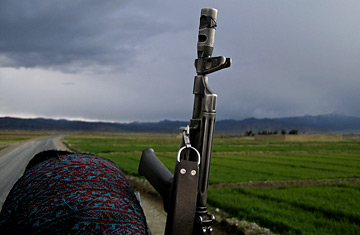
Afghan Border Police officers patrol near the Pakistani border in Gurbuz district, Khowst province, Afghanistan, March 13, 2007.
Our purpose in the pretty southeastern Afghanistan farming town was to report a story about cross-border terrorism. About 13 miles away, in Pakistan's North Waziristan tribal agency, lies Mir Ali, near which several Taliban training camps are said to be based. "That's the center of international terrorism," said our host Hajji Faisel Rahman Muslim. Whether or not that's true, many Khost residents are convinced that the town is the Qaeda headquarters responsible for the plague of suicide bombings (some 20 this year) that have rocked Khost.
In a peace accord signed last September with tribal leaders in North Waziristan, the Pakistani government agreed to scale down its operations in the area if local militants would refrain from attacking government troops and would end cross-border raids into Afghanistan. On that front, the agreement has clearly failed — cross-border attacks have increased threefold since September, according to U.S. military officials. Many of those have been bomb attacks on government officials and police officers in provincial capitals such as Khost. Last year, Hajji Muslim was nearly killed by a remote-detonated IED that blew apart his car and left him with chunks of shrapnel in his leg. When we traveled with him, it was with no small amount of caution.
Our guide's village is even closer to the border; he fled for the relative safety of Khost just after the attack. He refused to take us to the town, for fear of attack, and wouldn't let me go, either. He said that even disguised in a burqa, the way I walked would give me away as a foreigner, and my presence would create problems for the village. Instead, he said, Balazs could go, accompanied by Hajji Muslim's son — Balazs is Hungarian, and his black beard and dark eyes made it easier for him to pass. Maybe too well: A few moments after they drove away, the phone calls started coming in to Hajji Muslim's office. A possible suicide bomber had been spotted — maybe Uzbek, or Chechen, but certainly not from Khost.
You never really get used to suicide bombings, but in parts of the world where they happen a least once a week, they form a part of the backdrop of a journalist's life along with rocket attacks, IED blasts and the possibility of kidnappings. I've seen my fair share of blood and broken bodies, but somehow I feel like it won't happen to me.
Many times on my trip I got frustrated with Muslim for what I thought was his over-cautious refusals to take me closer to the border. He told my translator that I was far braver than him. "When I hear the Taliban are around, I run away. When she hears about Taliban, she wants to go see them." It may be true that I'd never been close enough to a suicide bomber or an exploding IED to learn to be afraid. But that's starting to change. About 15 minutes after Balazs and I left Khost for the 7-hour drive back to Kabul, a suicide bomber detonated himself when stopped by the police, killing four people and wounding a dozen more. He was heading towards Hajji Muslim's office. The Chief of Police said the bomber had been looking for two foreigners.
I tell myself all the time that suicide bombers are opportunists — determined to die while taking out the best accessible target. But still I feel guilty. Maybe if he hadn't been looking for foreigners he would have done less damage, somewhere else.
A suicide car bomber attacked a convoy of U.S. embassy officials today in Kabul, where I live. The bomber killed a 14-year-old Afghan boy. Slowly, I am learning to be afraid.
